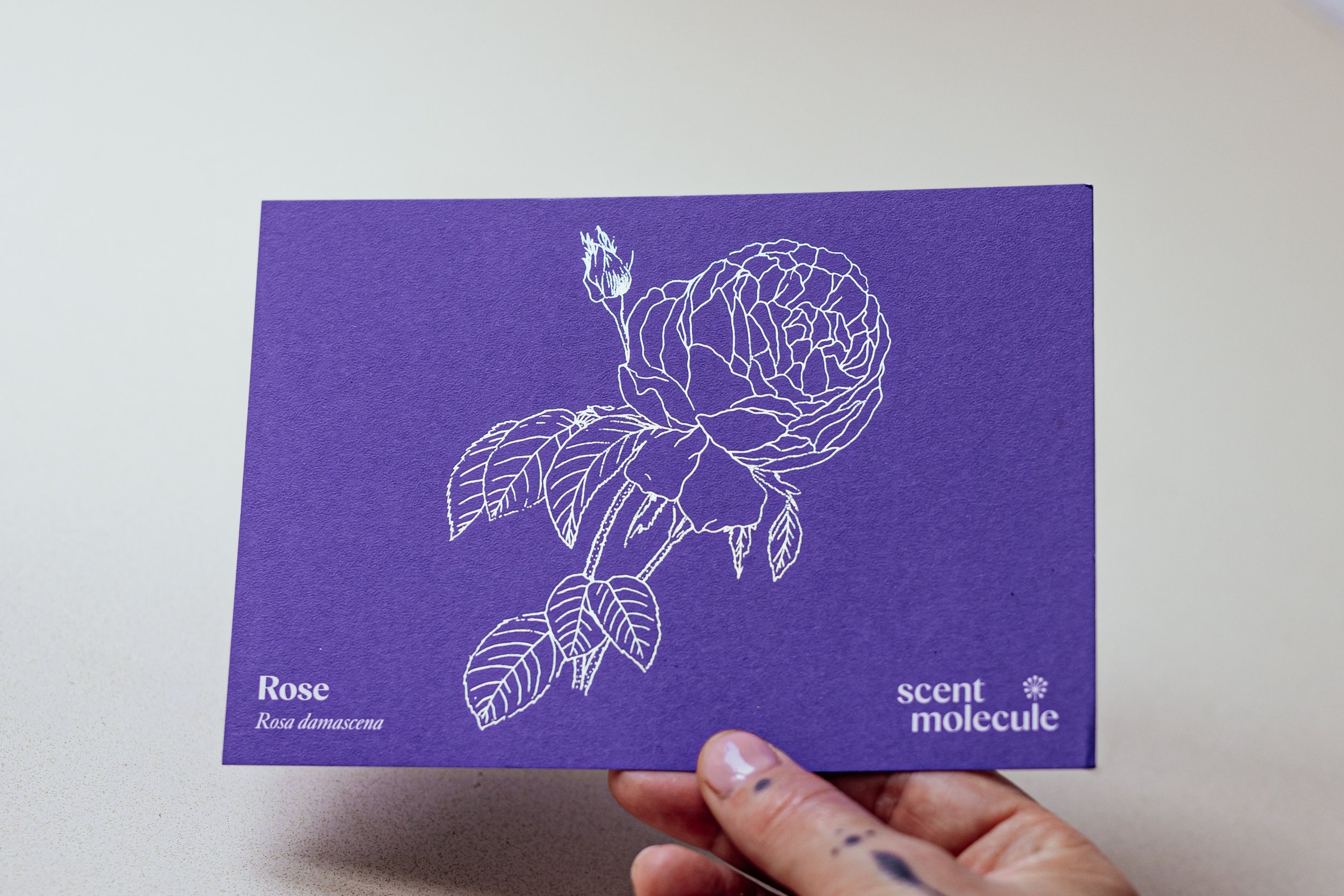-
-
Adults (general use): 1 % dilution
Facial/Sensitive skin use: 0.5% recommended
Always dilute before skin application. Perform a patch test on sensitive skin. Avoid contact with mucous membranes.
-
Rose is more than a fragrance, she is an energetic transmission of unconditional love, self-initiation, and deep feminine wisdom. Her signature is soft yet commanding, opening the heart with precision and grace. She resonates at one of the highest measured frequencies of any plant, making her a powerful ally for spiritual transformation, emotional healing, and devotional ritual.
Countless cultures have revered and loved the rose, with many goddesses “arming” themselves with her blooms as sacred symbols of beauty, sensuality, and sovereignty. The rose represents the eternal feminine principle and perhaps life itself. To experience her sweetness, we must also meet her thorns. Some traditions speak of the Tree of Life originally being a rose bush, symbolising the union of joy and suffering, of beauty and truth.
In Islamic mysticism, the rose is considered the scent of the human soul, its aroma evoking remembrance of spirit and divine beauty. It is said that if one smells the scent of rose with none present, angels may be near.
Rose is traditionally ruled by the planet Venus, archetype of beauty, harmony, sensuality, and love. Venus governs the heart chakra and all that refines relationship, with self, with others, and with the divine. As a botanical emissary of this current, rose teaches us how to receive, how to soften, and how to bloom without apology.
Use rose in Venusian rituals to:
Honour the cycles of beauty, love, and feminine expression
Call in sacred union and soul-aligned relationships
Support heart-based magnetism and abundance
Invoke harmony, elegance, and creative flow
Working with rose on Fridays (the day of Venus), or during Venus transits or retrogrades, can amplify devotional practices and personal intention.
Connection to the Magdalene & the Path of the Sacred Heart
Throughout mystic Christian, Gnostic, and temple traditions, rose is a symbol of the divine feminine mysteries, especially associated with Mary Magdalene. As the spiritual consort and equal of Yeshua, Magdalene embodied the Red Rose Path, the way of erotic innocence, inner alchemy, and embodied love.
Rose oil is often used in Magdalene anointing rituals to:
Clear grief from the heart and womb
Reawaken the codes of feminine sovereignty
Anchor the union of spirit and flesh, heaven and earth
Bless the path of sacred service and heart-led leadership
Her frequency speaks directly to the emotional body, making her especially potent for trauma resolution, reconnection to self, and spiritual repair through the senses.
-
Rose has long been regarded as a botanical heart-mender. She helps soothe the emotional body, especially during times of grief, heartbreak, or transition. Where there is overwhelm, she offers calm. Where there is sorrow, she brings soft resilience.
Her aromatic molecules work gently yet deeply on the limbic system, the part of the brain that governs emotion, memory, and stress response. Through this pathway, rose oil can help:
Regulate the nervous system in moments of emotional strain
Cultivate a sense of safety and self-compassion
Support emotional stability during cycles of hormonal fluctuation
Restore presence and calm when the heart feels heavy or guarded
She is a particularly wise companion during rites of passage, emotional vulnerability, or inner healing work, a plant that meets the heart where it is, and reminds us we are safe to feel.
Use diluted rose oil in inhalation, diffusion, or anointing practices to support:
Emotional grounding during stress or uncertainty
Reconnection to joy and self-worth after hardship
Gentle emotional release when tears won’t come
Moments of intimacy, self-touch, or mindful connection
-
Rose essential oil is traditionally used in natural skincare and wellness formulations for its gentle yet restorative properties. It may be beneficial in:
Soothing hot or irritated skin. Often included in blends for dry, sensitive, or reactive skin. Commonly applied in cases of redness, rashes, or general skin discomfort.
Skin repair and regeneration. Used to support the skin's natural healing processes, particularly for delicate or fragile complexions.
Cooling & comforting, Often used to balance heat or inflammation, especially in topical preparations.
Hormonal balance support. Traditionally used in topical applications associated with feminine care and cyclical comfort.
Topical relief – Applied in aromatherapy massage oils and body care products aimed at easing general tension or topical discomfort.
Night-time routines – May be included in preparations that support calm, rest, and skin replenishment overnight.
This essential oil is highly valued in both perfumery and wellness care for its versatility and gentle nature, especially when formulating for delicate or sensitive skin.
-
Rich, intoxicating, and unmistakably luxurious, rose essential oil exudes a sensual floral heart layered with sweet, dewy freshness. Its scent is deeply rosy, subtly spicy, and lingers with soft green undertones, offering a rounded, full-bodied aroma that speaks of grace, allure, and inner beauty.
Often described as exotic, floral, rosy, sweet, fresh, gently warm
This is a classic base to mid-note that enhances almost any blend with its emotional depth and aromatic complexity, revered in perfumery and cherished in aromatherapy.
-
Rose essential oil is considered exceptionally gentle and is widely regarded as safe for most skin types and general use when properly diluted.
Skin safety: Non-toxic, non-irritant, and generally non-sensitising.
However, as with all essential oils, always perform a patch test before topical use, especially on sensitive skin or facial areas.
Dilution: For facial or daily use, a 0.5–1% dilution is appropriate. For full-body applications, up to 3% is considered safe for adults.
Pregnancy & breastfeeding: While rose is often included in maternity blends for its emotional support and skin benefits, we recommend consulting a qualified clinical aromatherapist before use during pregnancy or while breastfeeding.
Medical conditions: If you have serious health conditions or are undergoing treatment, please consult a qualified healthcare professional before use.
Internal use: Although our founder is extensively trained in clinical aromatherapy and aromatic medicine, we do not recommend internal use of essential oils unless under the guidance of a qualified practitioner. Internal use requires professional knowledge, individual assessment, and careful dosage control.
Keep out of reach of children. Avoid contact with eyes, mucous membranes, or broken skin.
-
Container: Store in airtight, dark glass (preferably violet Miron or amber) bottles with secure caps to minimise oxidation and evaporation.
Temperature: Keep in a cool, stable environment (ideally 5–20 °C). Avoid exposure to heat sources or fluctuating temperatures.
Light: Protect from direct sunlight and artificial UV sources, which can degrade aromatic compounds.
Air Exposure: Minimise opening the bottle. If transferring oil, use sterilised glass droppers or pipettes.
Contact Materials: Avoid prolonged contact with plastics, rubber, or reactive metals, as rose oil constituents may degrade or leach materials


